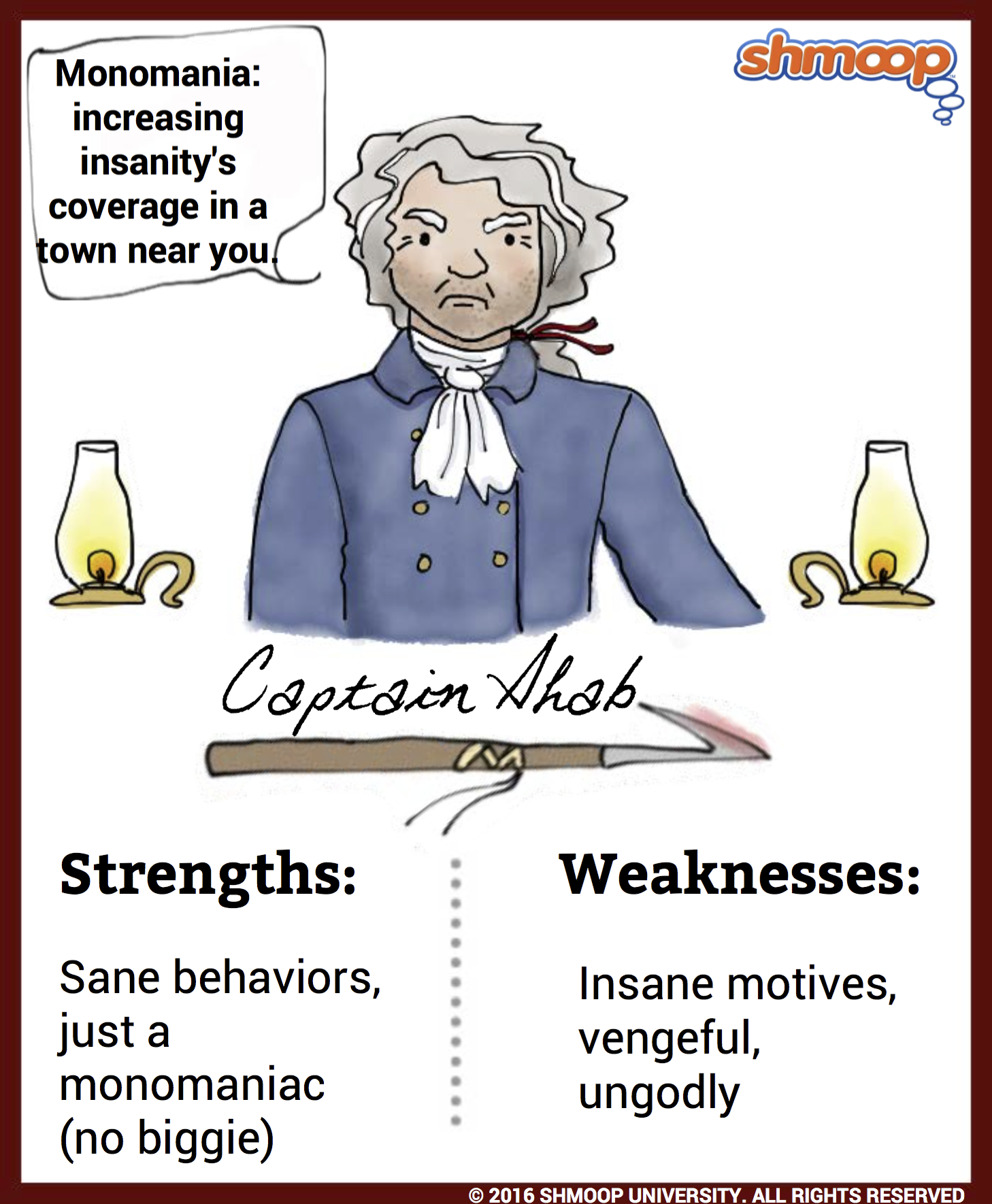Character Analysis

(Click the character infographic to download.)
Meet The Dude Whose Name Is Synonymous With Revenge
Captain Ahab: one of the best whaling captains in Nantucket, the commander of the Pequod, and definitely a bit odd. He's got an Oldboy-style vendetta against a dang whale, after all.
Late in the novel, Ahab begins to reminisce about how stark and lonely his life has been: he’s spent forty years working his way up on whaling ships, and only after he’s reached the far side of fifty does he marry. When he does get married (to a lady much younger than he is) he only gets to sleep with her once before he has to get right back out there into the ocean, leaving her a "whaling widow" with a child he’s never seen.
As if this weren’t sad enough, on his previous voyage the infamous Moby Dick managed to chomp Ahab’s leg off... leaving him with a peg leg made of whalebone ivory and an overwhelming desire for revenge.
Obsession: It’s Not Just A Calvin Klein Fragrance Anymore
Recuperating on board his previous ship and sick with fever after he’s lost his leg, Ahab gradually goes crazier and crazier, eventually blaming Moby Dick for everything bad that has ever happened to any human being ever since the beginning of time. (Really—we’re not making that up. That’s just how Melville describes him.) After several months, he’s able to get most of his insanity under some kind of control, but it’s still festering right under the surface.
Ahab behaves (sort of) like a sane man, but his motives are entirely insane. He resolves to use everything in his power to revenge himself on the White Whale, and agrees to be the captain of the Pequod in order to get an opportunity to pursue his vendetta.
Once the Pequod is too far away from Nantucket’s harbor to turn back easily, Ahab reveals his diabolical purpose to the crew, forcing them to swear that they’ll aid him in his ungodly revenge quest. And he’s got another surprise up his sleeve: before departing, Ahab smuggles his own harpooneer, Fedallah, and his own boat crew on board the Pequod... just in case the regular crew don’t want to risk their lives by being in a whaling boat captained by a lunatic.
Melville likes to describe Ahab as a "monomaniac," an interesting word because it suggests two things: first, that Ahab’s insanity focuses itself obsessively on a single thing (Moby Dick), and second, that he’s only insane when it comes to that one —he can be rational about just about everyone else.
Oh, The Tragedy!
In the democratic framework of a novel that likes to remind us just how egalitarian it is, Ahab, this rough, old Nantucket seaman, can be just as much of a tragic hero as Oedipus or King Lear.
Like King Lear, Ahab’s madness drives him out into the storm (at least, metaphorically), where he is aided only by his "fool," his jester, who is both crazier and saner than he is. These "fools" manage to give their respective tragic heroes excellent advice embroidered with snatches of songs and strange puns. Ahab’s "fool" is Pip, the young African-American man who goes mad when he leaps out of Stubb’s whaling ship in fear and is left to float alone in the open sea for half an hour.
Pip and Ahab become a strangely appropriate pairing: the monomaniac who’s losing his soul to his vengeance and the crazy boy who’s lost his sense of self because of his cowardice.
But it's not just ol' Lear that Ahab is emulating. He can be read as a mash-up of about a zillion different tragic heroes. He's part Oedipus (Ahab has a peg leg and Oedipus had a cane; both Ahab and Oedipus are worried about the amount of control they have over their own fate), part Narcissus and even part (gulp) Satan.
Hey, There’s A Man In The Bible Named Ahab
Like Ishmael, Ahab’s name has Biblical echoes that Melville exploits to add depth to his character. Ahab’s story is in 1 Kings 21; he’s the king who covets Naboth’s vineyard, which Naboth won’t give to him.
In the end, Queen Jezebel sets Naboth up by falsely accusing him of a crime. Naboth ends up getting stoned to death unjustly, as a result of which Ahab gets that vineyard he’s been wanting. But after all of this nefariousness, Elijah (check out Moby-Dick Chapter 19) prophesies that King Ahab’s blood will wind up in the same place as Naboth’s blood. Freaky, eh?
So what’s all this supposed to mean for our analysis of Ahab’s character in Moby-Dick? Well, like the Biblical Ahab, we expect him to desire something that he isn’t entitled to and that isn’t good for him to have, to end up getting it by foul means, and then to get his comeuppance in the form of an ironic reversal of his own evil deed.
Considering the way Ahab dies (Moby Dick drags him to his death) we think the name fits pretty nicely—talk about building your own gallows!
Wait A Minute, You’re Telling Me The Awesome Yet Obsessive Captain Doesn’t Win?
Yes, that's what we're telling you.
Captain Ahab's Timeline